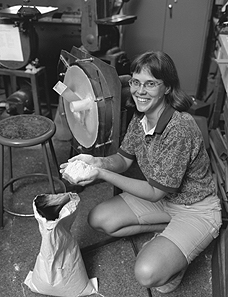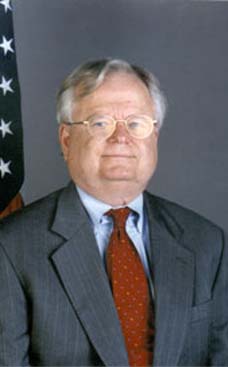
Ms. Smith said she wanted to avoid having the workshop end up as yet another academic exercise where the only outcome is often a set of paper proceedings or pledges. This time, she said, the goal was “no paper, just prototypes.” In fact, in the first days of the workshop, it seemed that the only paper in evidence was an ever-spreading, flower-petal array of blue, green, pink and yellow sticky notes on walls and blackboards. The notes charted the progression from basic needs (water, food, energy, health) to specific issues (a three-mile hike to and from the nearest water supply in a Tanzanian village, the lack of a well-testing kit that a Bangladeshi village clinic could afford). Ms. Smith placed participants in project teams. Then came round-table discussions, rough sketches, technical drawings and the first three-dimensional models. Half a dozen volunteer mentors helped the participants make their ideas more concrete. Some were academics, like Ariel Phillips of Harvard, whose specialty is group dynamics. Others were drawn from Ms. Smith’s black book filled with an array of fixers and crafters — people whose careers have been spent solving problems by turning metal, plastic, wood, circuitry and motors into working devices. They included Dennis Nagle, a former weapons designer who abandoned the profession, he said, during the Summer of Love and turned to lighting design and other things, like the 24-ton array of speaker cabinets for a Guns N’ Roses concert. Inventor Amy Smith teaches at the Massachusetts Institute of Technology and served as a Peace Corps Volunteer in Botswana.
Amy Smith's International Development Design Summit signals a shift in focus among companies, universities, investors and scientists toward attacking problems that hamper development in the world’s poorest places
Low Technologies, High Aims
By ANDREW C. REVKIN
Published: September 11, 2007
CAMBRIDGE, Mass. — Beneath the bustling “infinite corridor” linking buildings at the Massachusetts Institute of Technology, just past a boiler room, an assemblage of tinkerers from 16 countries welded, stitched and hammered, working on rough-hewn inventions aimed at saving the world, one village at a time.
M.I.T. has nurtured dozens of Nobel Prize winners in cerebral realms like astrophysics, economics and genetics. But lately, the institute has turned its attention toward concrete thinking to improve the lives of the world’s bottom billion, those who live on a dollar a day or less and who often die young.
This summer, it played host to a four-week International Development Design Summit to identify problems, cobble together prototype solutions and winnow the results to see which might work in the real world.
Mohamed Mashaal, a young British engineer headed for a job with BP on the North Sea this fall, poured water into a handcrafted plastic backpack worn by a design partner, Bernard Kiwia, who teaches bicycle repair in rural Tanzania and hopes to offer women there an easier way to tote the precious liquid for long distances.
Sham Tembo, an electrical engineer from Zambia, and Jessica Vechakul, an engineering graduate student at M.I.T., slowly added a cow manure puree to a five-gallon bucket holding charcoal made from corncobs. In the right configuration, the mix might generate enough electricity to charge a cellphone battery or a small flashlight for a year or more.
The summit (www.iddsummit.org) was the brainchild mainly of Amy Smith, a lecturer at M.I.T. who received her master’s there in 1995 and in 2004 won a MacArthur Foundation “genius” award, and Kenneth Pickar, an engineering professor at the California Institute of Technology. Faculty and students from Olin College, an engineering school near Boston, were also involved.
The flurry of activity was taking place at D-Lab, a research center and set of courses at M.I.T. devoted to devising cheap technologies that could have a big effect in impoverished communities. In homage to Ms. Smith’s passion for attacking poverty from the ground up, the lab is nicknamed “Amy’s World.”
Typically, D-Lab sends students abroad in midwinter breaks to work with people who are struggling with a lack of clean water, electricity, cooking fuels or mechanical power to turn crops into products. For four weeks, though, the real world had come to M.I.T.
Throughout the workshop, Ms. Smith served as scoutmaster, cheerleader, cook and personal shopper (when work flowed deep into the night), and she provided periodic reality checks.
She seemed dazed at times, but never fazed. “Everyone calls this an experiment,” Ms. Smith said of the workshop, the first of its kind. “I call it the realization of a vision.”
The work itself was often two steps back, not one step forward. As Lhamotso, a young woman from Tibet, and Laura Stupin, who just graduated from Olin, wrestled with a whirring Rube Goldberg mash-up of bicycle and grain mill, the chain slipped with a loud clang.
“We have a real friction problem,” Ms. Stupin yelled.
The workshop was developed over the last year by Ms. Smith, Dr. Pickar and others after a meeting to discuss a “design revolution” — a shift in focus among companies, universities, investors and scientists toward attacking problems that hamper development in the world’s poorest places.
“Nearly 90 percent of research and development dollars are spent on creating technologies that serve the wealthiest 10 percent of the world’s population,” Ms. Smith said. “The point of the design revolution is to switch that.”
She added: “There are several different places where that revolution has to take place. We started thinking, ‘How do we train engineers so they might start thinking of this as a field of engineering they’d want to pursue?’ ”
Developing a pedal-powered grain mill or a backpack for water, as workshop participants did, was only a first step. The teams also had to be sure that their creations could be built of local materials cheaply enough to be bought by the world’s poorest people, that they could be fixed easily and fit ways of living that have deep-rooted rhythms.
The workshop began in mid-July, with the arrival of nearly 50 visitors from Brazil, Ghana, Guatemala, Tanzania, Tibet and other countries.
Most of the $200,000 budget was provided by donations from individuals and private groups, including the National Collegiate Inventors and Innovators Alliance, which supports university programs to develop commercially viable products that advance society.
The workshop began with a lecture by Paul Polak, a psychiatrist turned entrepreneur, who develops simple solutions for the problems of the poor. Dr. Polak, who has become something of a guru to the design revolution movement, railed against conventional charity and insisted that the route to prosperity lies in inventions that improve lives but mesh with existing lifestyles.
He laid out the principles of development from the bottom up, including the importance of first listening and watching, then following the old dictum “small is beautiful” with another, equally important one: “cheap is beautiful.”
The goal, he said, should be to improve a million lives, and to make technologies that can be sold and bought in increments — like a drip-irrigating system that can expand as a farmer’s income rises. Dr. Polak said in an interview that at least in the classroom, the push for such initiatives was coming from young people.
Ms. Smith said she wanted to avoid having the workshop end up as yet another academic exercise where the only outcome is often a set of paper proceedings or pledges. This time, she said, the goal was “no paper, just prototypes.”
In fact, in the first days of the workshop, it seemed that the only paper in evidence was an ever-spreading, flower-petal array of blue, green, pink and yellow sticky notes on walls and blackboards. The notes charted the progression from basic needs (water, food, energy, health) to specific issues (a three-mile hike to and from the nearest water supply in a Tanzanian village, the lack of a well-testing kit that a Bangladeshi village clinic could afford).
Ms. Smith placed participants in project teams. Then came round-table discussions, rough sketches, technical drawings and the first three-dimensional models.
Half a dozen volunteer mentors helped the participants make their ideas more concrete. Some were academics, like Ariel Phillips of Harvard, whose specialty is group dynamics. Others were drawn from Ms. Smith’s black book filled with an array of fixers and crafters — people whose careers have been spent solving problems by turning metal, plastic, wood, circuitry and motors into working devices. They included Dennis Nagle, a former weapons designer who abandoned the profession, he said, during the Summer of Love and turned to lighting design and other things, like the 24-ton array of speaker cabinets for a Guns N’ Roses concert.
The mentors’ task was making things work. “Ladies and gentlemen, we’re on the verge of a Home Depot run,” announced Jock Brandis, who had driven to the workshop from Wilmington, N.C. After a career building contraptions on movie sets, Mr. Brandis now helps run the Full Belly Project, which develops machines to simplify village work.
Mr. Brandis noted that the budget for developing a peanut sheller for a Malian village was far different from that for building a camera-toting vehicle in rural Mexico to film Antonio Banderas galloping through the desert as Zorro. But the challenge of filling a niche with limited materials and tools is similar.
The other similarity is that both kinds of design begin with a blank slate. As Mr. Brandis put it: “It’s, ‘Here’s the model high-rise made of Styrofoam, and then the flying saucer has to fly into it, and we need to shoot it three times from three different angles, and next Tuesday it’s got to happen.’ ”
At the workshop, Mr. Brandis examined with approval one group’s design for an oven with three grates of progressively finer mesh to hold charcoal fuel, so that big pieces that have not burned down stay separate from more fully consumed fuel, limiting harmful smoke.
“What you try to do in virtually every situation is make their lives more efficient,” he said. “That’s what the big revolution in America was between 1860 and 1960 — that a person doing a day’s work can produce a lot more product. And that means time is more valuable and that means he has more time to do other things.”
Ashley Thomas, an entering senior at M.I.T., explained the appeal of such work while struggling with a teetering metal frame for a cooler that uses evaporation from wet fabric instead of electrical components to draw heat from its contents. The idea was conceived with participants from Tibet, where meat must be stored for weeks in isolated rural areas, and India, where heat can quickly ruin a vendor’s inventory.
“Imagine a fruit vendor in a rural area or the slums,” explained Deepa Dubey, a partner of Ms. Thomas, who studies product design as a graduate student in Kanpur, India. “He comes with all his fruit and vegetables. At the end of the day he makes one dollar, and whatever is left he has to throw it away because he can’t store it.”
Ms. Thomas said, “Amy’s class is about the hardest class to get into at M.I.T., including at the Sloan School, which is basically about how to make a million dollars after you graduate.”
She added: “It’s taking industrial design theory and applying it to where you can have the greatest impact. Here, $5 worth of angle iron and towels could mean a month’s supply of food. To me, that’s just worth so muc



















